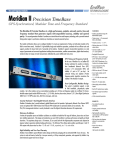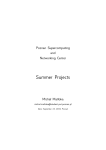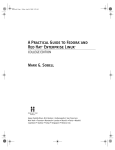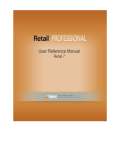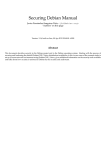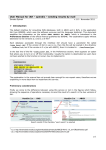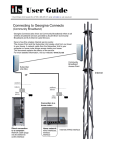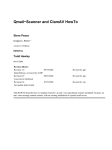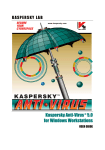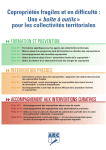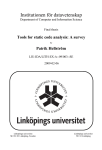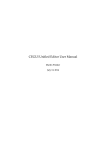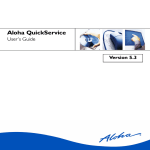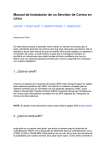Download BogoSec: Source Code Security Quality Calculator
Transcript
BogoSec: Source Code Security Quality Calculator Dustin Kirkland [email protected] Loulwa Salem [email protected] May 2006 Abstract BogoSec is a source code security quality metric tool. It wraps multiple source code scanners, invoking them on its target code, and produces a final score that approximates the security quality of the code. BogoSec aims to increase awareness of source code vulnerablites by identifying greatly offending code and charting security quality trends over time. For additional information on BogoSec, please refer to the Web site http://bogosec.sourceforge.net/. 1 Background The CERT Coordination Center (CERT/CC) reported 5,990 vulnerabilities in 2005 compared to 171 in 1995. Many software security vulnerabilities occur because of poor programming practices. Some vulnerabilities are algorithmically detectable by static source code scanners designed for identifying potential security issues. As the number and severity of potential security holes per line of code increase, it is reasonable to believe that the overall quality of the source code in terms of security decreases. BogoSec metrics are computed values that attempt to reflect relative ratings of source code security quality for comparative purposes. The motivation behind BogoSec is to influence developers to produce more secure source code over time. Various scanners exist that point developers to potentially insecure sections of code, however, developers are often reluctant to use such scanners because of a seemingly high degree of “false positive” output as well as the difficulties associated with use. BogoSec attempts to reduce the penalty of false positives while broadening the scope of the source scan by using multiple independent scanners. This produces highlevel metrics that allow developers and users alike to comparatively judge the quality of the source code in terms of security. 1 2 Methodology Several source code scanners exist that identify numerous vulnerabilities with varying accuracy and success. BogoSec parses the output of any number of source code scanners and computes its metric based on the number, severity, and frequency of potential bugs found as per number of lines scanned. BogoSec currently supports the following scanners: • Flawfinder • ITS4 • RATS Support for additional scanners is easily extended by creating plugins that understand the input parameters and parse the output of the new scanners. This is useful for incorporating support for proprietary or internal scanning tools or newer public tools. BogoSec requires that at least one of the scanners listed in this paper is installed on the system and can be found in the path. These scanners are not distributed as part of BogoSec. However, BogoSec does include plugins that interface with each scanner. The basic methodology of BogoSec is as follows: 1. Execute each scanner present on target source code or tree 2. Parse output of each scanner, determining the filename, line number, severity, description of each possible vulnerability 3. Interpret the severity indicator and adjust to a common scale (by default, 10 being most severe, 1 being least severe) to calculate “severity points” 4. Report the total number of vulnerability severity points, as well as the total number of lines analyzed by each scanner 5. Calculate and report the BogoSec final score BogoSecFinalScore = TotalVulnerabilityPointsFromAllScanners TotalLinesO fCodeAnalyzedByAllScanners Figure 1: BogoSec Implementation Diagram 2 The algorithm above considers weighted vulnerabilities. The total number of vulnerability severity points accumulates as scanners identify potential vulnerabilities. The ratio of points per line is the indicator by which users of BogoSec are able to compare source code in terms of security quality. BogoSec operates under the assumption that as the number of weighted severity points per line increases, the overall security quality of the compiled code decreases. 3 Implementation BogoSec is implemented as a Perl script and accompanying Perl modules. You can add support for additional scanners by creating a module that executes the scanner against the source code, interprets the output, and normalizes severity ratings to BogoSec’s scale. The other modules can be used as templates for new modules. Initially, BogoSec sets up its execution environment by parsing configuration files and reading command line parameters. (See the manpage for an extensive description of command line options.) The final parameter specifies the target; BogoSec handles the following: • a single source file • an entire source tree • an archive (*.tar.gz, *.tgz) • a source RPM (*.src.rpm) BogoSec handles the last two formats by creating a temporary directory and expanding the code accordingly. Additionally, the src.rpm targets are rebuilt using the %prep section of the spec file which applies all patches to the source code. The script builds a list of files in the target tree, consisting of any file case insensitively matching (*.c, *.h, *.cpp, *.c++). BogoSec executes scanners on each file individually. Although some scanners have the ability to recursively scan an entire tree, the stability and consistency of BogoSec favors compiling the results of individually scanned files. BogoSec is multithreaded such that all three scanners execute simultaneously on the list of files, waiting for the slowest scanner to complete execution before analyzing the results. False positives are one of the main discourging factors against running source code scanners. BogoSec implements a mechanism to exclude vulnerabilities in an effort to reduce false positives. Using command line options, users may specify a list of vulnerabilities to be excluded from the final calculation. Additionaly, while parsing each scanner’s output, BogoSec keeps a running total of all the vulnerability types encountered and reports those findings if you choose to run in verbose mode. Each scanner’s plugin has a routine defined for analyzing the particular output of that scanner. This consists of scanning each line of output to determine if the line specifies an identified potential vulnerability. If it does, the filename, line number, severity, and description are parsed out according to rules defining each scanner’s output conventions. The severity is scaled according to BogoSec’s scale (by default, a 10-point scale). The plugin obtains the number of lines of source code scanned from the output whenever possible. Additionally, BogoSec implements a mechanism to exclude vulnerabilities in an effort to allow the user to reduce false positives. This data is stored in a structure accessible by the main program. Finally, the main program tallies the number of points accumulated by all scanners on all files, as well as the number of lines of code scanned by all scanners in all files. The BogoSec final score is this quotient, which the script reports and then exits. 3 4 Output Samples BogoSec’s benefit lies mainly in its ability to simplify the process of understanding other scanner results and distilling the information to metrics. For the purpose of this demonstration, a sample of each scanner’s output against the Sendmail-8.13.5 package is shown, followed by BogoSec’s results and a snapshot of the BogoSec wrapper against a list of packages. 4.1 Flawfinder Developed by David Wheeler and released under GPL version 2, Flawfinder is written in Python and uses a built-in database of C/C++ functions with well-known problems to produce a sorted list of hits or potential security flaws. Flawfinder uses a scale of 1-5, with 5 being the maximum level of vulnerability to categorize its hits. The following is an excerpt from Flawfinder’s output: Flawfinder version 1.26, (C) 2001-2004 David A. Wheeler. /tmp/bogosec.temp target.DTtf4m/sendmail-8.13.5/include/sm/io.h:141: [2] (buffer) char: Statically-sized arrays can be overflowed. Perform bounds checking, use functions that limit length, or ensure that the size is larger than the maximum possible length. ... /tmp/bogosec.temp target.DTtf4m/sendmail-8.13.5/include/sm/string.h:53: [4] (buffer) strcpy: Does not check for buffer overflows when copying to destination. Consider using strncpy or strlcpy (warning, strncpy is easily misused). ... /tmp/bogosec.temp target.WOEdpn/sendmail-8.13.5/mailstats/mailstats.c:74: [3] (buffer) getopt: Some older implementations do not protect against internal buffer overflows . Check implementation on installation, or limit the size of all string inputs. ... /tmp/bogosec.temp target.WOEdpn/sendmail-8.13.5/libsmutil/safefile.c:495: [5] (race) readlink: This accepts filename arguments; if an attacker can move those files or change the link content, a race condition results. Also, it does not terminate with ASCII NUL. Reconsider approach. 4 4.2 RATS Rough Auditing Tool for Security was developed by a team from Secure Software Solutions and is licensed under the GPL. RATS is capable of scanning C, C++, Perl, PHP and Python code. The tool uses a High, Medium, and Low rating to categorize its hits. The following is an excerpt from RATS’ output: Analyzing /tmp/bogosec.temp target.DTtf4m/sendmail-8.13.5/libsm/b-strl.c /tmp/bogosec.temp target.DTtf4m/sendmail-8.13.5/libsm/b-strl.c:70: High: fixed size local buffer Extra care should be taken to ensure that character arrays that are allocated on the stack are used safely. They are prime targets for buffer overflow attacks. /tmp/bogosec.temp target.DTtf4m/sendmail-8.13.5/libsm/b-strl.c:73: High: getopt Truncate all input strings to a reasonable length before passing them to this function /tmp/bogosec.temp target.DTtf4m/sendmail-8.13.5/libsm/b-strl.c:103: Low: strlcpy Double check that your buffer is as big as you specify ... /tmp/bogosec.temp target.WOEdpn/sendmail-8.13.5/libsm/test.c:83: High: fprintf Check to be sure that the non-constant format string passed as argument 2 to this function call does not come from an untrusted source that could have added formatting characters that the code is not prepared to handle. ... /tmp/bogosec.temp target.WOEdpn/sendmail-8.13.5/libsm/sscanf.c:85: Low: strlen This function does not properly handle non-NULL terminated strings. This does not result in exploitable code, but can lead to access violations. 5 4.3 ITS4 It’s The Software Stupid Source Scanner (ITS4) is developed by Cigital and it scans C and C++ source code. Note that ITS4 is not released under an OSI-approved open source license. ITS4 reads a vulnerability database from a text file at startup, which allows for additions of new vulnerabilites easily. ITS4 uses a Low Risk, Some risk, Risky, Very Risky, and Urgent scale to categorize its hits. The following is an excerpt from ITS4’s output: /tmp/bogosec.temp target.DTtf4m/sendmail-8.13.5/include/sm/string.h:59:(Very Risky) strcpy This function is high risk for buffer overflows Use strncpy instead. ... /tmp/bogosec.temp target.DTtf4m/sendmail-8.13.5/libsm/b-strl.c:198:(Urgent) printf Non-constant format strings can often be attacked. Use a constant format string. ... /tmp/bogosec.temp target.DTtf4m/sendmail-8.13.5/libsm/stdio.c:132:(Some risk) read Be careful not to introduce a buffer overflow when using in a loop. Make sure to check your buffer boundries. ... /tmp/bogosec.temp target.WOEdpn/sendmail-8.13.5/libsm/ungetc.c:72:(Low Risk) memcpy Low risk of buffer overflows. Make sure that your buffer is really big enough to handle a max len string. /tmp/bogosec.temp target.WOEdpn/sendmail-8.13.5/libsm/stdio.c:352:(Risky) fstat Can lead to process/file interaction race conditions (TOCTOU category C) Manipulate file descriptors, not symbolic names, when possible. 6 4.4 BogoSec The scanners discussed previously in this paper give valuable insights into potential security vulnerabilities. Some of them even offer suggestions on how to eliminate those vulnerabilities. It is necessary to look over these outputs if you need to understand the vulnerabilities in detail in order to fix them. On the other hand, developers often need a quick gauge of their code, or administrators need a simple comparison mechanism to aid them in making a software choice. BogoSec provides concise output, indicating the scanners used, the severity points, and lines scanned for each scanner separately. BogoSec calculates the total points, total lines scanned and finally the BogoSec score. The following is a sample of the BogoSec output: bogosec sendmail.8.13.5.tar.gz Running flawfinder... Running rats... Running its4... flawfinder 4210 points 88100 lines rats 7943 points 117742 lines its4 4386 points 128906 lines >>> Using scanners: (flawfinder rats its4 ) >>> 16539 total severity points >>> 334748 total lines of code scanned >>> final score = 0.0494083111275749 7 4.5 BogoSec Wrapper Early detection of security vulnerabilities helps with their timely resolutions before they pose a potential threat. System administrators often perform routine checks of their systems by running overnight scripts and analysis tools to find and remedy any potential problems. BogoSec wrapper is designed to aid in this effort by providing a mechanism for running BogoSec on a large sum of packages automatically. The wrapper is capable of handling a large number and mixture of target types supported by BogoSec. Results of the wrapper tool are saved in a tabular, easy-to-read format. One file contains only the total points, lines, and score for each scanned target, and a second file contains detailed BogoSec output showing the breakup of each scanner. For added flexibility, BogoSec wrapper accepts command line options that provide output file names, as well as command options specific to BogoSec. The following is a sample of the wrapper output file: START : Mon Jan 09 15:57:00 CST 2006 ====================================== Package SevPoints 4Suite-1.0-3.src.rpm 20377 acpid-1.0.3-2.src.rpm 896 alsa-lib-1.0.6-3.src.rpm 10862 am-utils-6.0.9-10.src.rpm 10149 anacron-2.3-32.src.rpm 617 mingetty-1.07-3.src.rpm 451 apmd-3.0.2-24.src.rpm 2410 rwho-0.17-22.src.rpm 1399 cracklib-2.7-29.src.rpm 1900 inn-2.3.5-12.src.rpm 77187 . . . 8 Lines Of Code 133664 4269 227617 129569 4617 1194 9250 3859 6997 249509 Final Score 0.1524519192 0.2098852190 0.0477205129 0.0783263486 0.1337087574 0.377442769402568 0.260540540540541 0.362615530793815 0.271544947834786 0.309354238390866 5 Testing To verify the operation of BogoSec and the reliability of its results, test cases have been executed, documented, and studied. BogoSec was executed on several popular packages against all released versions available for download. These tests demonstrate BogoSec’s use against a given package to indicate the general trend of the quality of source code over subsequent releases. Also, several equivalent open source software packages (when available) were tested to compare in an absolute sense which of the packages have better BogoSec scores. The following popular packages tested across released versions: • Web server – Apache • Secure Shell – OpenSSH • FTP servers – vsftpd – wu-ftpd • Mail transfer agents – Sendmail – Qmail – Postfix • Scripting languages – Perl – PHP – Python – Ruby 9 5.1 Web Servers Apache is the world’s most popular Web server, accounting for over 60% of all internet Web sites. The Apache 1.3 tree has been under constant development since 1998 and up to the present. In that time, the Apache team has added many features and fixed many bugs. Apache 2.0 is the next generation Web server from the Apache development team. 5.1.1 Results These test results show consecutive runs of BogoSec against all Apache 1.3 (in maroon) and 2.0 (in blue) released versions available. Absolute Points: The overall scores of 1.3 are very slowly, but smoothly, increasing. On the other hand, the tremendous spike between 2.0.18 and 2.0.28 (both beta releases) should cause some concern. Also, it looks like the 2.0.44 release fixed some security problems present in previous releases. Points / Line: Both versions exhibit BogoSec ratios that are generally improving over time, though the 2.0 releases have better scores than the 1.3 branch. Figure 2: Web Servers Score Package apache apache apache apache apache apache apache apache apache apache apache apache apache apache apache apache apache apache apache apache apache apache Version 1.3.0 1.3.11 1.3.12 1.3.14 1.3.17 1.3.19 1.3.1 1.3.20 1.3.22 1.3.23 1.3.24 1.3.27 1.3.28 1.3.29 1.3.2 1.3.31 1.3.32 1.3.33 1.3.3 1.3.4 1.3.6 1.3.9 Score 0.0896 0.0811 0.0812 0.0809 0.0809 0.0799 0.0879 0.0797 0.0814 0.0808 0.0798 0.0796 0.0790 0.0791 0.0888 0.0817 0.0816 0.0816 0.0889 0.0871 0.0880 0.0806 LOC 186578 256983 257446 267005 270501 271083 190542 272119 276845 280312 285126 287594 290025 290240 195124 284938 285458 285501 196542 202112 206900 247724 Points 16711 20841 20895 21595 21889 21654 16753 21681 22546 22660 22761 22900 22923 22965 17329 23287 23305 23305 17479 17596 18209 19963 Figure 3: Web Servers Points Package httpd httpd httpd httpd httpd httpd httpd httpd httpd httpd httpd httpd httpd httpd httpd httpd httpd httpd httpd httpd Version 2 0 15 2 0 16 2 0 18 2 0 28 2.0.32 2.0.35 2.0.36 2.0.39 2.0.40 2.0.42 2.0.43 2.0.44 2.0.45 2.0.46 2.0.47 2.0.48 2.0.49 2.0.50 2.0.51 2.0.52 10 Score 0.0537 0.0573 0.0555 0.0686 0.0676 0.0672 0.0665 0.0651 0.0659 0.0649 0.0646 0.0571 0.0568 0.0569 0.0566 0.0565 0.0603 0.0597 0.0594 0.0594 LOC 409238 413056 468691 570302 594210 617261 624265 639129 648812 661539 664596 678224 685602 688417 689951 693187 655544 658322 661497 661740 Points 21965 23673 26035 39112 40162 41503 41540 41620 42737 42933 42925 38701 38918 39160 39044 39191 39517 39305 39268 39308 5.2 Secure Shell Servers OpenSSH provides an encrypted command shell, usually for remote network access to systems. OpenSSH is primarily developed by members of the OpenBSD project, a group of developers known for securityconscious code. OpenBSD conducts extensive manual audits of source code to identify and fix security vulnerabilities. 5.2.1 Results The following graphs demonstrate admirable models for secure software development. Both sets of data seem to approach asymptotes, with Absolute Points gradually increasing, and Points/Line scores gradually decreasing, and neither have significant spikes. The false positives reported by the tools could well form the asymptote base of these graphs. Figure 4: Shell Servers Score Package openssh openssh openssh openssh openssh openssh openssh openssh openssh openssh openssh openssh openssh openssh openssh Version 2.1.1p4 2.2.0p1 2.3.0p1 2.5.1p1 2.5.1p2 2.5.2p1 2.5.2p2 2.9.9p1 2.9.9p2 2.9p1 2.9p2 3.0.1p1 3.0.2p1 3.0p1 3.1p1 Score 0.1329 0.1305 0.1252 0.1128 0.1126 0.1106 0.1106 0.1040 0.1040 0.1048 0.1048 0.1039 0.1039 0.1039 0.1018 LOC 92619 93999 108205 122159 122387 128989 129019 143107 143107 133867 133972 143342 143351 143319 144189 Points 12307 12267 13549 13778 13778 14266 14266 14880 14880 14029 14040 14899 14899 14897 14683 Figure 5: Shell Servers Points Package openssh openssh openssh openssh openssh openssh openssh openssh openssh openssh openssh openssh openssh openssh Version 3.2.2p1 3.2.3p1 3.3p1 3.4p1 3.5p1 3.6.1p1 3.6.1p2 3.6p1 3.7.1p1 3.7.1p2 3.7p1 3.8.1p1 3.8p1 3.9p1 11 Score 0.0961 0.0961 0.0954 0.0952 0.0953 0.0945 0.0945 0.0946 0.0895 0.0894 0.0895 0.0864 0.0895 0.0869 LOC 159646 159660 161720 161964 166756 170301 170316 170270 178101 178288 178084 181919 181852 186467 Points 15342 15342 15430 15416 15899 16101 16101 16101 15943 15943 15943 15722 16269 16203 5.3 FTP Servers Vsftpd and wu-ftpd are two major open source FTP servers. The first, vsftpd, was written with security as a primary objective, with the “vs” meaning “very secure”. The second, wu-ftpd, is Washington University’s FTP server, which pre-dates vsftpd and has a history of security vulnerabilities. 5.3.1 Results These charts show a drastic difference in source-code security between vsftpd and wu-ftpd. Both BogoSec scores of vsftpd appear orders of magnitude better than wu-ftpd. This is consistent with the popular opinion regarding the security of these two FTP servers. Figure 6: FTP Servers Score Package vsftpd vsftpd vsftpd vsftpd vsftpd vsftpd vsftpd vsftpd vsftpd vsftpd vsftpd vsftpd Version 0.9.2 1.0.1 1.1.0 1.1.1 1.1.2 1.1.3 1.2.0 1.2.1 1.2.2 2.0.0 2.0.1 2.0.2 Score 0.0201 0.0197 0.0196 0.0194 0.0188 0.0194 0.0194 0.0185 0.0185 0.0195 0.0195 0.0194 LOC 25656 26149 27784 28029 28868 29228 32849 34409 34540 37607 37657 37883 Points 515 515 544 544 544 568 637 637 637 734 734 734 Figure 7: FTP Servers Points Package wu-ftpd wu-ftpd wu-ftpd wu-ftpd wu-ftpd wu-ftpd wu-ftpd wu-ftpd wu-ftpd wu-ftpd Version 2.0 2.1 2.2 2.3 2.4.2 2.4 2.5.0 2.6.0 2.6.1 2.6.2 12 Score 0.2912 0.3282 0.3403 0.3403 0.2743 0.3384 0.2754 0.3093 0.3047 0.3051 LOC 24345 24334 26388 26385 35509 26495 54752 63603 65322 65212 Points 7089 7986 8980 8980 9741 8966 15081 19670 19903 19898 5.4 Mail Transfer Agents Postfix, Qmail, and Sendmail are major open source mail transfer agents (MTAs). Sendmail has long served as the primary mailer for UNIX environments, but Sendmail’s history is riddled with exploitable security vulnerabilities. Alternative MTA’s have emerged, such as Postfix and Qmail, whose purpose was to address Sendmail’s security shortcomings. Postfix was written and is maintained by an expert member of IBM Research in secure computing. Qmail is another option with a notably small code base designed in the interest of security. 5.4.1 Results These results are interesting in that the package that has the lowest absolute scores (Qmail) does not have the lowest points/line ratios. This is because of the significantly smaller code base of Qmail, and perhaps identifies an unfair BogoSec bias toward larger projects. However, this is exactly why both metrics must be considered. The Postfix scores are very good, as expected. A concerted effort by the Sendmail development team between releases 8.11 and 8.12 demonstrates a marked BogoSec score improvement. Since that time, Sendmail has maintained approximately the same status. Figure 8: Mail Servers Score Package postfix postfix postfix qmail qmail qmail qmail qmail Version 1.0.8 1.1.13 2.1.5 0.92 1.00 1.01 1.02 1.03 Score 0.0241 0.0222 0.0193 0.0669 0.0660 0.0679 0.0693 0.0722 LOC 199281 237491 293908 44957 44913 44918 45339 46737 Points 4800 5273 5683 3008 2966 3050 3143 3377 Figure 9: Mail Servers Points Package sendmail sendmail sendmail sendmail sendmail sendmail sendmail 13 Version 8.11.7 8.12.10 8.12.11 8.13.0 8.13.1 8.13.2 8.13.3 Score 0.0894 0.0501 0.0500 0.0494 0.0493 0.0493 0.0493 LOC 232285 324450 325152 330588 331157 331607 331647 Points 20775 16251 16265 16330 16341 16335 16335 5.5 Scripting Languages Open source scripting languages include Perl, PHP, Python, and Ruby. Each of these provide a higher level programming language easily used by developers to easily and quickly accomplish software tasks. A binary interpreter is needed by each of these languages to execute the scripted source code. 5.5.1 Results Ruby and Python have the lowest absolute and ratio scores. PHP, by far, has the largest code base and the highest absolute points. In all cases, the latest release shows marked improvement over the earliest release. Figure 10: Scripting Languages Score Package perl perl perl perl perl php php php php php php php php php Version 5.005 5.6.1 5.8.6 5.9.0 5.9.1 3.0.18 4.2.0 4.2.3 4.3.10 4.3.8 4.3.9 5.0.0 5.0.1 5.0.3 Score 0.0502 0.0456 0.0457 0.0475 0.0484 0.0753 0.0512 0.0516 0.0441 0.0446 0.0444 0.0361 0.0358 0.0357 LOC 278627 386938 523662 500034 498403 406914 876430 893882 1227476 1216570 1221208 1433945 1431329 1441051 Points 13982 17649 23908 23765 24145 30655 44854 46141 54180 54224 54194 51758 51212 51379 Figure 11: Scripting Languages Points Package Python Python Python Python ruby ruby ruby ruby ruby ruby ruby ruby ruby ruby 14 Version 2.1.3 2.2.3 2.3.4 2.4 1.3.5 1.3.7 1.3 1.4.0 1.4.6 1.6.0 1.6.8 1.8.0 1.8.1 1.8.2 Score 0.0315 0.0247 0.0263 0.0214 0.0580 0.0578 0.0539 0.0578 0.0572 0.0561 0.0510 0.0421 0.0394 0.0353 LOC 628654 746199 895668 980119 203286 203739 183631 204141 207843 219104 240446 396570 426031 492828 Points 19797 18461 23539 20976 11792 11781 9893 11799 11887 12299 12267 16687 16778 17405 5.6 All Packages Tested The following data shows an absolute comparison of the latest release of all packages tested above. Be somewhat cautious of this comparison, because it’s difficult to compare vastly different packages, especially when one package consists of a few hundred lines of code and another comprises millions of lines of code. Still, this chart teaches some valuable lessons about the advantages of BogoSec as well as, perhaps, some of its shortcomings. 5.6.1 Results Absolute Points: It seems that vsftpd, Qmail, and Postfix are clear winners–these being packages designed and implemented by experts to be secure software. On the other end of the spectrum, httpd and PHP totaled the highest number of points–probably because of the fact that these are two of the largest packages that were tested. Points / Line: Again, Postfix and vsftpd exhibited the best scores, while wu-ftpd scored several orders of magnitude worse than the rest of the field–consistent with the popular opinion of its state of security. All four of the scripting languages (Python, PHP, Ruby, Perl) appear to have relatively similar BogoSec scores. It is somewhat surprising to see Apache, httpd, and OpenSSH near the upper end of the spectrum. This also deserves further investigation as it is possible that these packages are yielding an abnormally high number of false positives, thereby driving their scores disproportionately higher. Figure 12: All Packages Score Package postfix vsftpd ython ruby php perl sendmail httpd qmail apache openssh wu-ftpd Version 2.1.5 2.0.1 2.4 1.8.2 5.0.3 5.9.1 8.13.3 2.0.52 1.03 1.3.9 3.9p1 2.6.2 Score 0.0193 0.0195 0.0214 0.0353 0.0357 0.0484 0.0493 0.0594 0.0722 0.0806 0.0869 0.3051 LOC 293908 37657 980119 492828 1441051 498403 331647 661740 46737 247724 186467 65212 Figure 13: All Packages Points Points 5683 734 20976 17405 51379 24145 16335 39308 3377 19963 16203 19898 15 6 Applications We hope that BogoSec drives developer awareness of insecure code by providing a higher level interface to numerous scanners. One way of encouraging developers to use these existing tools is by integrating BogoSec into some common development tools and processes, such as: • source code repositories • integrated development environments • text editors • build processes • package installation managers 7 Conclusion BogoSec aims to reduce source code security vulnerabilities by simplifying the process of identifying and eliminating them. The following is a recap of the functionality and uses of BogoSec, as well as future improvements: • BogoSec provides a convenient interface that should make developers and users more conscious of the security quality of software packages. • Given a diverse set of software packages, BogoSec is able to accurately identify those with the highest and lowest security quality. • Given a set of subsequent releases of a software package or a single file, BogoSec is able to chart the security quality progress over time. • Additional work is necessary to further BogoSec and push for more widespread adoption including: – a complexity factor - BogoSec currently seems to prefer packages with a larger code base, which is counterintuitive to the adage that “simplicity is the ally of security.” – tool integration - BogoSec metric calculation could be integrated into additional tools, such as package installation managers. – reduction of “false positive” effects - More skillful use of the actual source-code scanners could produce more accurate vulnerability output. – incorporation of more and new scanners. 16 8 References • CERT/CC ( http://www.cert.org/stats/cert stats.html ) • IBM – IBM ( http://www.ibm.com ) – Linux Technology Center (http://oss.software.ibm.com/linux/ ) • BogoSec – BogoSec Web site (http://bogosec.sourceforge.net/ ) • Scanners – Flawfinder (http://www.dwheeler.com/flawfinder/ ) – RATS (http://www.securesoftware.com/rats/ ) – ITS4 (http://www.cigital.com/its4/ ) • Packages Tested – Apache (http://www.apache.org) – OpenSSH (http://www.openssh.org) – Perl (http://www.perl.org) – PHP (http://www.php.net) – Postfix (http://www.postfix.org) – Python (http://www.python.org) – Qmail (http://www.qmail.org) – Ruby (http://www.ruby-lang.org) – Sendmail (http://www.sendmail.org) – vsftpd (http://vsftpd.beasts.org) – wu-ftpd (http://www.wu-ftpd.org) 17 9 APPENDIX A : BogoSec Manual Page BOGOSEC(1) BogoSec User Manual BOGOSEC(1) NAME bogosec - source-code security quality metric using established static source-code scanners SYNOPSIS bogosec [-l] [--log-dir directory ] [--min-sev 0-10 ] [--nhf] [-p plugin name [args] ] [--plugin-dir directory ] [--sev-range-max num ] [--timeout num ] [--temp-log-dir directory ] [-v 0|1 ] [--xp plugin name ] [--xv vuln list ] TARGET DESCRIPTION BogoSec attempts to influence developers to produce more secure source-code over time. Various existing scanners point developers to potentially insecure sections of code. BogoSec broadens the scope of source-code scans by utilizing multiple independent scanners and compiling the results into high level calculated metrics. These metrics can help developers and users alike to comparatively judge the security quality of source-code. OPTIONS -l Turn on scanner output logging. Log will be called <scanner name>.log and created in current working directory, unless --log-dir is used to specify a different location. --log-dir directory Specify a directory for scanner output logs (only makes sense if -l is also used). Default is current working directory. --min-sev minimum severity level Specify a minimum severity level. Any vulnerabilities reported by the scanners whose score falls below this number will be ignored. The argument must be a number 0-10. Default is 0. --nhf, --no-header-files Do not scan header files. header files. Useful if the scanners being used do not support scanning -p, --plugin plugin name [args] Specify a plugin to use. If no plugins are defined on the command-line, all of the plugins in the plugins dir will be used. This option can be passed more than once, to specify a set of scanners to use. Each scanner requires a separate instance of the --plugin flag (please see examples). Optionally, a set of command-line arguments can be passed to the scanner - this feature must be used with care. Keep in mind that the plugin requires a certain formatting of the scanner output (for example, -SQ is always passed to flawfinder, and -w 3 is always passed to rats). You can pass additional command-line arguments using this option, but be aware of the effect it might have on the formatting of the scanner output, and the effect that will have on the plugins ability to parse it correctly. If you must change the defaults (-SQ, -w 3, etc.) you 18 must edit the plugin directly. --plugin-dir directory Specify the directory where the plugins are stored. Default is /usr/local/bogosec/plugins. --sev-range-max number Specify the maximum severity value to be used in calculating the severity value range. The default is 10. For example, setting --sev-range-max to 50 would mean that the severity results would now be on a scale of 0-50 instead of on a scale of 0-10. This can be used to scale the result if more granularity is required. NOTE: -v 1 will not work if this option is used. --timeout number Specify the cpu time limit in seconds. Some scanners might hang, in order to overcome this problem you may choose to set the timeout to an appropriate period to kill the scanner process. For example setting --timeout 60, will kill any remaining scanner processes after 60 seconds, and return control to the main bogosec process. This option uses the ulimit command, please refer to ulimit manpage for additional information. --temp-log-dir directory Specify a directory where you want the temporary files used by BogoSec to be stored (scanner output logs, etc.) The default is /tmp/. -v, --verbosity 0|1 Specify verbosity level (default is 0). If 1, then a graph of the severity points is shown, which breaks the results down by severity levels. This option does not work if the --sev-range-max is changed from 10. --xp, --exclude-plugin plugin name Do not run plugin defined by plugin name. --xv, --exclude-vuln vuln list Exclude the vulnerabilites in the vuln list from the final bogosec calculation. vuln list is a ":" separated list of vulnerability identifiers. TOOLS bogosec wrapper provides a method to run bogosec automatically on a directory containing multiple targets. Please refer to bogosec wrapper man page for additional information. FILES /etc/bogosec.conf Global configuration file. users /.bogosecrc file. The settings here are overwritten by any settings in /.bogosecrc Default user configuration file (overrides the settings in /etc/bogosec.conf). This file is not created during an installation, you must create it yourself. /usr/local/bogosec/plugins/ 19 Default plugins directory. Can be changed with --plugin-dir option. be executable, and must end in .pm as per convention. Plugins must /usr/local/bogosec/documents/ Directory of BogoSec documentation and other germane documents. SCANNERS FlawFinder : http://www.dwheeler.com/flawfinder ITS4 : http://www.cigital.com/its4 RATS : http://www.securesoftware.com/resources/tools.html BUGS Not all input validated. Not all environmental variables checked. expects to be run by trusted users. This program AUTHORS Developed by Dustin Kirkland, Agoston Petz, and Loulwa Salem at the IBM Linux Technology Center. http://sourceforge.net/projects/bogosec/ Linux Jan 25 2005 20 BOGOSEC(1) 10 APPENDIX B: BogoSec Wrapper Manual Page BOGOSEC(1) BogoSec Wrapper User Manual BOGOSEC(1) NAME bogosec wrapper - Wrapper script for BogoSec source-code security quality metric tool SYNOPSIS bogosec wrapper [OPTIONS] TARGET-DIRECTORY DESCRIPTION bogosec wrapper automates the process by running bogosec on a directory containing different file formats supported by bogosec and collecting the results. Results by default are collected in the following files: /tmp/bogosec-results.<timestamp> and /tmp/bogosec-details.<timestamp> (where timestamp is the current system time in HourMinSec format). Users can specify different destination files on the command line. bogosec wrapper accepts options to be passed on to bogosec, options are passed in "" with the flag --bo. (example: bogosec wrapper --bo "--nhf --timeout 60" /Target Directory). WRAPPER OPTIONS --rf, results file file-name Specify results file --df, details file file-name Specify detailed results file --bo, bogo opts bogosec options Specify bogosec options (must be included in "") BOGOSEC OPTIONS The following is a brief explanation of bogosec options; for additional information, please refer to bogosec man page. -l Turn on scanner output logging. --log-dir directory Specify a directory for scanner output logs --min-sev minimum severity level Specify a minimum severity level. --nhf, --no-header-files Do not scan header files. -p, --plugin plugin name [args] Specify a plugin to use. 21 --plugin-dir directory Specify the directory where the plugins are stored. Default is /usr/local/bogosec/plugins. --sev-range-max number Specify the maximum severity value to be used in calculating the severity value range. The default is 10. --timeout number Specify the cpu time limit in seconds. --temp-log-dir directory Specify a directory where you want the temporary files used by BogoSec to be stored (scanner output logs, etc.) The default is /tmp/. -v, --verbosity 0|1 Specify verbosity level. The default is 0. --xp, --exclude-plugin plugin name Do not run plugin defined by plugin name. --xv, --exclude-vuln vuln list Exclude the vulnerabilites in the vuln list FILES Default: Default: /tmp/bogosec-results.<timestamp> /tmp/bogosec-details.<timestamp> AUTHORS Developed by Dustin Kirkland, Agoston Petz, and Loulwa Salem at the IBM Linux Technology Center. http://sourceforge.net/projects/bogosec/ Linux Mar 07 2005 22 BOGOSEC(1) Legal Statement This work represents the view of the author and does not necessarily represent the view of IBM. IBM, IBM (logo), e-business (logo), pSeries, e (logo) server, and xSeries are trademarks or registered trademarks of International Business Machines Corporation in the United States and/or other countries. Linux is a registered trademark of Linus Torvalds. Other company, product, and service names may be trademarks or service marks of others. 23























